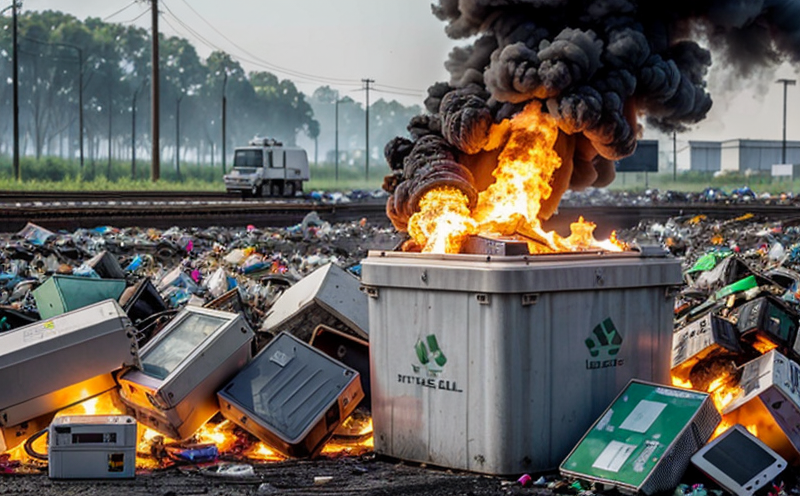
-
Chemical Safety and Certification-
Chemical Safety in Electronics Recycling-
International Regulations for E-Waste Chemical Safety
We provide comprehensive solutions designed to help our clients mitigate risks, enhance performance, and excel in key areas such as quality, health & safety, environmental sustainability, and social responsibility.
Discover
For many years, our organization has been operating successfully, boasting modern laboratories that meet international standards. These laboratories are equipped with the latest technology devices and equipment, and we have built a strong team of experienced and trained personnel to operate them.
DiscoverWelcome to Eurolab, your partner in pioneering solutions that encompass every facet of life. We are committed to delivering comprehensive Assurance, Testing, Inspection, and Certification services, empowering our global clientele with the ultimate confidence in their products and processes.
Discover
-
Chemical Safety and Certification-
Chemical Safety in Electronics Recycling-
International Regulations for E-Waste Chemical SafetyAs electronic waste (e-waste) continues to grow at an alarming rate worldwide, it is crucial to have effective regulations in place to manage the chemical hazards associated with e-waste recycling and disposal. E-waste contains a range of hazardous chemicals, including heavy metals, flame retardants, and solvents, which can pose serious risks to human health and the environment. To address these risks, international regulations have been established to ensure safe practices in handling and recycling e-waste. This guide explores the key international regulations and agreements that govern chemical safety in e-waste management, highlighting their significance in promoting global environmental protection and worker safety.
1. The Basel Convention on the Control of Transboundary Movements of Hazardous Wastes and Their Disposal
2. The European Union Waste Electrical and Electronic Equipment (WEEE) Directive
3. The Restriction of Hazardous Substances (RoHS) Directive
4. The United Nations Environment Programme (UNEP)
5. The Stockholm Convention on Persistent Organic Pollutants (POPs)
To ensure compliance with these international regulations and mitigate the risks associated with hazardous chemicals in e-waste, the following best practices should be adopted by recycling facilities, manufacturers, and governments:
1. Implement Safe E-Waste Management Systems
2. Use Environmentally Friendly Technology
3. Promote Eco-Design
4. Monitor and Report Compliance
International regulations play a pivotal role in ensuring the safe handling, recycling, and disposal of e-waste chemicals. Agreements such as the Basel Convention, the WEEE Directive, RoHS, and the Stockholm Convention set global standards for managing the hazardous chemicals found in e-waste, protecting both human health and the environment. By adhering to these regulations, governments, manufacturers, and recycling facilities can reduce the risks associated with e-waste and contribute to a more sustainable future.
Interested in ensuring compliance with global e-waste regulations? Contact us for expert advice on navigating the complexities of chemical safety in electronics recycling.

Renewable Energy Testing and Standards
Renewable Energy Testing and Standards: Ensuring a Sustainable Future The world is rapidly transiti...

IT and Data Center Certification
IT and Data Center Certification: Understanding the Importance and Benefits The field of Informatio...

Consumer Product Safety
Consumer Product Safety: Protecting Consumers from Harmful Products As a consumer, you have the rig...

Aviation and Aerospace Testing
Aviation and Aerospace Testing: Ensuring Safety and Efficiency The aviation and aerospace industr...

Environmental Simulation Testing
Environmental Simulation Testing: A Comprehensive Guide In todays world, where technology is rapidl...

Cosmetic Product Testing
The Complex World of Cosmetic Product Testing The cosmetics industry is a multi-billion-dollar ma...

Pressure Vessels and Installations Testing
Pressure Vessels and Installations Testing Pressure vessels are a critical component of various ind...

Lighting and Optical Device Testing
Lighting and Optical Device Testing: Ensuring Performance and Safety Lighting and optical devices a...

Construction and Engineering Compliance
Construction and Engineering Compliance: Ensuring Safety, Quality, and Regulatory Adherence In the ...

Agricultural Equipment Certification
Agricultural equipment certification is a process that ensures agricultural machinery meets specific...

Trade and Government Regulations
Trade and government regulations play a vital role in shaping the global economy. These regulations ...

Electrical and Electromagnetic Testing
Electrical and Electromagnetic Testing: A Comprehensive Guide Introduction Electrical and electrom...

Environmental Impact Assessment
Environmental Impact Assessment: A Comprehensive Guide Environmental Impact Assessment (EIA) is a c...

Fire Safety and Prevention Standards
Fire Safety and Prevention Standards: Protecting Lives and Property Fire safety and prevention stan...

NEBS and Telecommunication Standards
Network Equipment Building System (NEBS) and Telecommunication Standards The Network Equipment Bu...

Food Safety and Testing
Food Safety and Testing: Ensuring the Quality of Our Food As consumers, we expect our food to be sa...

Electromechanical Safety Certification
Electromechanical Safety Certification: Ensuring Compliance and Protecting Lives In todays intercon...

Hospitality and Tourism Certification
Hospitality and Tourism Certification: Unlocking Opportunities in the Industry The hospitality and ...

Railway Industry Compliance
Railway Industry Compliance: Ensuring Safety and Efficiency The railway industry is a critical comp...

Energy and Sustainability Standards
In today’s rapidly evolving world, businesses face increasing pressure to meet global energy a...

Battery Testing and Safety
Battery Testing and Safety: A Comprehensive Guide As technology continues to advance, battery-power...

Pharmaceutical Compliance
Pharmaceutical compliance refers to the adherence of pharmaceutical companies and organizations to l...

Transportation and Logistics Certification
Transportation and Logistics Certification: A Comprehensive Guide The transportation and logistics ...

Chemical Safety and Certification
Chemical safety and certification are critical in ensuring the safe management of products and proce...

Product and Retail Standards
Product and Retail Standards: Ensuring Quality and Safety for Consumers In todays competitive marke...

Healthcare and Medical Devices
The Evolution of Healthcare and Medical Devices: Trends, Innovations, and Challenges The healthcare...

Industrial Equipment Certification
Industrial equipment certification is a critical process that ensures industrial equipment meets spe...

MDR Testing and Compliance
MDR Testing and Compliance: A Comprehensive Guide The Medical Device Regulation (MDR) is a comprehe...

Military Equipment Standards
Military Equipment Standards: Ensuring Effectiveness and Safety The use of military equipment is a ...

Automotive Compliance and Certification
Automotive Compliance and Certification: Ensuring Safety and Efficiency The automotive industry is ...